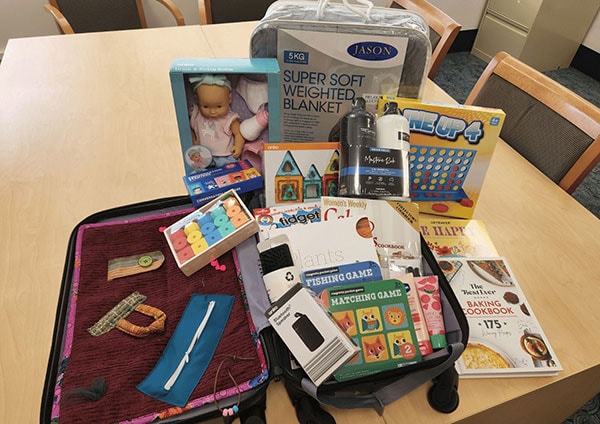
Being admitted to hospital can be a very confronting experience. Patients may feel scared and vulnerable, especially if they have an underlying cognitive impairment such as dementia, or if they are experiencing confusion as a result of the reason for their admission (for example, postoperative delirium).
It is important that caregivers are properly equipped to help patients remain calm and engaged in what can be an unfamiliar hospital environment, to minimise distress and ensure the best possible outcomes during their stay.
St John of God Subiaco Hospital caregivers noticed an increase in cognitively impaired patients being admitted to the hospital, and recognised the need to take extra steps to ensure these patients were as comfortable as possible. Specialist nurse managers, social workers and occupational therapists worked together and came up with the idea to create special kits for cognitively impaired patients to use during their stay in the hospital, to offer calming distractions and also support the connection between caregivers and patients. The kits would include things like baby dolls, colouring books, fiddle activities, books, magazines, music, card games, weighted blankets and more.
Thanks to the support of our kind donors, these kits have become a reality. Susanna Murphy, St John of God Subiaco Hospital’s Performance Improvement Manager, says the kits are already helping patients and caregivers at the hospital.
“The kits are now used as part of our training program for patient care assistants and volunteers, who often sit with patients. The kits help to settle patients and caregivers may also use them to drive interactions that are meaningful and aid in reassuring the patient,” she said.
“One of the most successful items we are able to put in our cognitive impairment kits is the weighted blanket, which is scientifically proven to assist with calming, reassuring and managing anxiety in a variety of conditions including cognitive impairment.”
Items such as the weighted blanket are single patient use only, which means these kits would not be possible without donor support.
“It was so wonderful to be able to share with the team that through the generous support of community donations we would be able to establish these kits and go the extra mile to support these patients and their families during a challenging time,” Susanna said.
I would love to say a huge thank you to all of the donors who have made these kits possible. Improving the care and experience for these extremely vulnerable patients is so meaningful and impactful. Please know the difference you have and will make and how grateful we are for your support.
